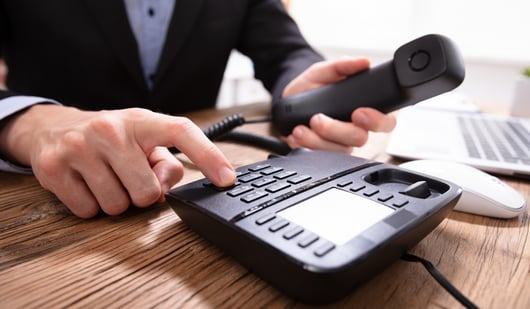
In August of 2019, the FCC passed two new pieces of legislation: the Repack Airwaves Yielding Better Access for Users of Modern Services (RAY BAUM’S) Act of 2018 (H.R.4986) and Kari’s Law, recently passed. Various parts of these laws have already taken effect, while others will be enforced in the next two years. With portions of the Act coming into effect on January 6th, 2020, here are the details you need to know to stay compliant.
What is RAY BAUM’S Act?
RAY BAUM’S Act is an acronym for Repack Airwaves Yielding Better Access for Users of Modern Services Act of 2018. The name is unwieldy, but the legislation is important.
RAY BAUM’S Act addresses emergency calls. According to the law, 911 calls will need to automatically pass along “dispatchable location” — including street address, floor level, and room number of the caller — to first responders so they can find the caller as quickly as possible.
By January 6, 2021, all wired devices will need to provide a dispatchable location so that personnel can locate the 911 caller. By January 6, 2022, the law will apply to all wireless devices in your hotel, too.
What is Kari’s Law?
Kari’s Law is named after Kari Hunt, a homicide victim in a 2013 incident in a hotel room. Her daughter tried to call 911 but could not reach an outside line because she was unaware that the hotel’s phone system required a prefix, even in emergencies.
Kari’s Law will require that all MLTS (Multi-Line Telephone Systems) allow their users to dial 911 directly from any line without being routed through any internal processes or needing to dial a prefix. As of February 16, 2020, It also requires that no entity can install, operate, or manage any MLTS unless that system is equipped to dial 911 directly.
The law also requires an “onsite notification.” Any emergency calls placed from an MLTS will not only reach emergency services, but the front desk or the reception desk in the building will also be notified that a guest or employee might be in distress. Employees of the building will almost always be faster to respond than emergency services, and they can provide vital assistance in the interim.
What These Laws Mean for Your Hotel
As of September 23, 2019, all MLTS manufacturers and providers are required to:
- Enable users to call emergency services from any internal telephone without dialing an additional digit, code, prefix, or trunk-access code. This portion of the act is Kari’s Law.
- Notify on-site personnel — a security desk, employee on-call, or third-party security service — of the call and the location where it originated.
- Pass along the call’s dispatchable location to emergency services regardless of the platform used to place the call.
All hotels must implement a new compliant system or upgrade their current systems. This upgrade will be easy for those with a voice over internet protocol (VoIP) system already.
All of your phone lines are digital, which means they can be routed however you choose. Notifications are also simple to set up, so your front desk staff — or mobile managers, administrative staff, or anyone else you choose — can be notified that a 911 call has been placed.
Talk to Phonesuite for Any Compliance Needs
These laws will catapult lots of businesses that use MLTS — nursing homes, hotels, and any business with a centralized phone system — into the 21st century. If your hotel uses an analog phone system, compliance with this law will be difficult, if not impossible.
The obvious solution is to switch to a VoIP system. With a digital phone system, run through a web browser and your existing high-speed internet connection, you can set any calls to 911 to bypass your internal phone tree. Such calls can also send a notification to one or several numbers of your choice, including the cell phone number of a manager on duty. You can attach specific location information to each phone line as well, including the building, floor, and room from which the call came.
Best of all, VoIP is upgradeable and future-proof. Since the whole system is digital, you can add or remove phone lines — and change the way that phone calls are handled — whenever and however you want. Contact Phonesuite today for a consultation and estimate.